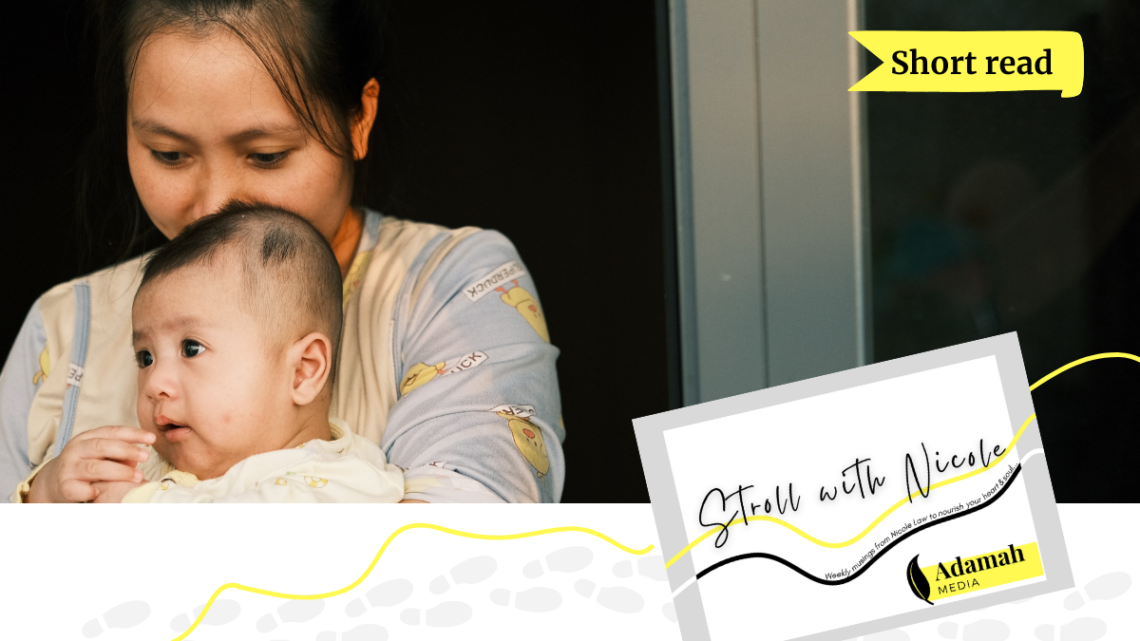
Understanding mothers
Nicole Law scratches the surface of motherhood to discover the ocean of love which often lies (well) hidden beneath.
“Hers was tougher than tough love. It was brutal, industrial-strength. A sinewy love that never gave way to an inch of weakness. It was a love that saw what was best for you ten steps ahead, and didn’t care if it hurt like hell in the meantime.”
These words of Korean-American author Michelle Zauner in her powerful memoir Crying in H Mart really struck me as I read them. Michelle detailed her relationship with her mother down to the last glance and shift in tone.
Some of us can identify with the ‘industrial-strength love’ Michelle talks about as we recall the various moments in our own lives when we have bemoaned our mothers for being too harsh, too exacting or too critical.
Like Zauner, I am Asian and understand well the Tiger Mum spirit so characteristic of the women of this continent. A fierce and ferocious love for one’s children which associates driving them towards success (usually seen in academic terms) as an expression of one’s concern for them. They must get on – but in the accepted forms of our culture.
If we step away for a second, though, we may begin to see the source and motivation of this type of love – a deep devotion which only wants the best for us but which might sometimes be miscommunicated or misinterpreted.
Michelle described her rebellious teenage phase, a rite of passage for most of us as adolescents. That stage of the assertion of independence and the desire to make choices for ourselves, while not knowing their full consequences.
The folly of youth involves idealism and a separation from the familial unit in the hope of carving out a route of one’s own through the great adventure of life. When some of our decisions end up in less than ideal outcomes, we realise that maybe our mothers were indeed ‘ten steps ahead’.
It could be down to having more life experience or having a kind of maternal sixth sense.
Somehow, a mother can sense that a car is speeding towards her child and instinctively pushes him or her out of harm’s way.
It’s an unexplainable gut feeling that motivates the mother to selflessness and sacrifice.
To be a mother means to set aside one’s own individual desires and dreams (at least to some extent) for the benefit of one’s children. It may mean giving up one’s career to care for them and, in the process, renouncing that slice of independence which is so precious to every human being.
As a young woman who is actively considering motherhood herself, I look at the lives of the new mums I know and see a shift in priorities.

To be a mother fundamentally means to share one’s life with one’s child. It starts from the point of conception, where the foetus depends wholly on the mother for nourishment. There is a connection that exists between mother and child, regardless of how the everyday experience of motherhood may be lived.
A lot of the labour of motherhood lies beyond the first nine months; it lies in the negotiation of what it means to guide and protect one’s child. I don’t know what kind of mother I will be (if God wills it), but I do know that a lot of motherhood is unexplainable as it will be a conscious (or sometimes unconscious) choice to want the best for my child.
In our youth, many of us do not fully understand our mothers and why they are the way they are. This is the source of much frustration, conflict and distance.
Yet in truth, mothers are flawed for they are human just like the rest of us.
Michelle Zauner remarked in her book: “Isn’t it nice how we actually enjoy talking to each other now?” Perhaps many of us feel the same as we have grown up and matured. We can now sit across each other at the dinner table and better understand why our mothers mothered us in specific ways.
We now understand that her attention to detail was meant to instill a meticulous mind. We now understand that her insistence on seeing things through has nurtured us into people who persevere in the face of difficulty. We now understand that her high expectations were an invitation to strive and to reach our full potential.
In time, we gain clarity and understanding. While we may still not fully understand why our mothers behave in certain ways, we can come away with greater empathy and perspective.
As Mother’s Day approaches in many parts of the world, maybe some of us are struggling in our relationships with our mothers. Maybe some of us have lost contact with them. Maybe some of us have lost our mothers through death. Let us take a step back, send our mothers a message of appreciation or a bouquet of fresh flowers and thank them for the sacrifices they made, big and small.
Michelle Zauner encapsulates the paradox of a mother’s love in her beautiful summary: “Love was an action, an instinct, a response roused by unplanned moments and small gestures, an inconvenience in someone else’s favor.”
Like what you’ve read? Consider supporting the work of Adamah by making a donation and help us keep exploring life’s big (and not so big) issues!
Nicole Law
Nicole Law is a writer for Adamah Media. She is an educator based in sunny Singapore. Her calling is not only to mould young minds, but also to nourish souls through her faith-based podcast. She has a soft spot for burnt cheesecake, Dean Martin and swing dance. When she’s not engaging with her listeners, she’s planning new conversations for her podcast - she believes in the power of conversations and the beauty of our relationships.

